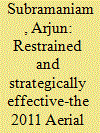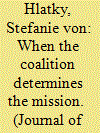| Srl | Item |
| 1 |
ID:
150103


|
|
|
|
|
| Summary/Abstract |
This article investigates the Swedish decision to participate in Operation Unified Protector in Libya and the Finnish decision to refrain from the same operation. It takes as its theoretical point of departure the concept of strategic culture and argues that differences in the strategic culture of the two countries contributed to the differences in behavior toward the Libya intervention. The Finnish and Swedish strategic cultures differ with respect to the core tasks of the armed forces, willingness to use force, and with respect to what types of operations and organizational frameworks Finland and Sweden find it appropriate to participate in.
|
|
|
|
|
|
|
|
|
|
|
|
|
|
|
|
| 2 |
ID:
130726


|
|
|
|
|
| Publication |
2014.
|
| Summary/Abstract |
The winter of 2011 was a dramatic period for air power in Mediterranean Europe and India. Operation Unified Protector (OUP), the successful North Atlantic Treaty Organisation (NATO) offensive aerial campaign that paved the way for a regime change in Libya, involved two platforms that had been shortlisted for the largest fighter aircraft deal of recent times. In the race for the 126 Medium Multi-Role Combat Aircraft (MMRCA) for the Indian Air Force (IAF), both the Eurofighter Typhoon and Dassault Rafale-platforms that were well exploited during the Libyan campaign-had been shortlisted over the much fancied US fighters, the F-18 and the F-16. Taking note of the highly professional conduct of the IAF during the flight trials, both the UK and France attempted to woo the IAF by showcasing the capabilities of the aircraft and other enabling platforms against the backdrop of their successful employment in diverse roles during OUP from March to October 2011. Numerous presentations were made at various seminars in New Delhi by Royal Air Force (RAF) and French Air Force (FAF) operational commanders who had taken part in the campaign, both at operational and tactical levels.
|
|
|
|
|
|
|
|
|
|
|
|
|
|
|
|
| 3 |
ID:
153434


|
|
|
|
|
| Summary/Abstract |
This article integrates literature on strategic culture with literature on the domestic politics of foreign policy, illustrating how the interaction of culture and domestic political calculation can influence government foreign policy on participation in international military operations. Empirically, the article investigates the decision made by the Government of Finland to refrain from participation in the military intervention in Libya in March–April 2011. The Finnish decision-making illustrates that domestic politics, in particular the factor of election timing, can strengthen the feeling among decision-makers that they should follow the country’s strategic culture. The article ends with theorization on the domestic political conditions under which decision-makers are more or less likely to deviate from strategic culture.
|
|
|
|
|
|
|
|
|
|
|
|
|
|
|
|
| 4 |
ID:
186093


|
|
|
|
|
| Summary/Abstract |
In this article, we argue that the composition of coalitions is key to understanding military operations, because it encompasses decisive intra-coalition dynamics such as great power and alliance politics, caveats and institutional constraints. The case study analysis, focused on NATO’s war in Libya, relies on content analysis of national and NATO policy documents as well as interviews with policymakers and military officials. We find that, while great powers predictably shape how missions are designed and carried out, their precise influence is affected by factors that are inherent to a coalition’s composition.
|
|
|
|
|
|
|
|
|
|
|
|
|
|
|
|